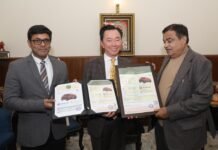Bangalore, Karnataka, India | 16th March 2020: To promote the culture of innovation and entrepreneurial spirit among students and researchers, Dayanand Sagar University in association with Atal Innovation Mission and NITI Aayog has established the Atal Incubation Centre-Dayanand Sagar University (AIC-DSU) Foundation in Bengaluru, today. The AIC-DSU is primarily established to bring in a problem-solving culture among students as well as to foster world-class innovation-incubation models. This culture coupled with the ecosystem that is supportive of innovation would enable ideas to flourish. Good and promising ideas are taken up for further nurturing and examined for its business potential; which then is adopted to be transformed into entrepreneurship.
The event featured distinguished guests: Mr. Ramanan Ramanathan (Mission Director Additional Secretary – NITI Aayog), Dr. H P Kincha (Evangelist, DSU) and Prof. R. Janardhan (Pro-Vice-Chancellor-DSU).
AIC-DSU Foundation – established by DSU is supported by Atal Innovation Mission which functions under the NITI Aayog – has its focus areas in: Healthcare, Mobility and Waste Management. In terms of infrastructure, it has incubation space with labs to support research and solution development. It has well established training rooms, product display area to showcase product exhibits and Mentor-Administration zone along with conferencing and VC facilities.
The AIC-FDSU Foundation plans to augment support in the areas like Maker Space, embedded systems & amp; IOT, Data Centre and Nvidia Machine Learning. The event also saw presentations made on battery management system to deal with pollution and climate change, passive radar sensors for real-time ocean monitoring using ground- based sensor and drones and CCTV cameras to manage waste management by faculty, students and budding entrepreneurs.
Dr. H P Kincha made a startling address as he says, “Since innovation has become the common currency, government has introduced schemes and initiatives horizontal and vertical to encourage entrepreneurship activities in the country and DSU too shares the same vision.” He further adds, “Converting investment into knowledge and knowledge into revenue is a huge stake. I believe that AIC-DSU with all its resources would be able to manage this challenge.”
Chief Guest, Ramana Ramanathan delivered an inspiring note that among the 3000 odd applications, DSU was one of the first universities in India that was endorsed by the Atal Incubation Mission under NITI Aayog to set up an entrepreneurial partnership with a grant support of Rs. 10 crores spread over 5 years to make the incubation centre self-reliant. “Every individual is an innovator says Ramanan, and further urges the youth to innovate in areas that has market potential. This forethought should be a guiding principle for every student to see greater success.”
“After a visit to the labs established by large MNCs, he suggested that students whose projects are not able to see commercial launch, can be given an extension. The path to adventure is now more time tested and the opportunities to succeed is now a phone call away at DSU. Expertise and experts, markets and opportunities are in your own campuses. Thus, it is a very compelling reason for the youth to look into starting an enterprise which was not possible in the past,” adds Ramanan. Coming to the AIC at DSU he stated, “Here is a full ecosystem: VCs, Mentors, networking, industry labs, lawyers, patent specialists, chartered accountants, company secretaries, subject & product specialists, buyers, vendors, suppliers and creative designers among others available under one roof. The fee for availing a service is frozen by AIC-DSU. To reduce travelling and time burden it has well informed consultants approved by the institution available at defined time schedules. This also applies when entrepreneurs want to procure raw materials, borrow funds, find buyers or hire people at different levels. With this, I see strong reasons for entrepreneurs to succeed in high percentage and this center could reach national heights,” adds Ramanan.
I have to congratulate and place on record the passion, commitment and perseverance demonstrated by Prof Janardhan and his team over the past 12-15 months to establish the AIC at DSU. The extremely fast, quick and very professional team work and the leadership is one of the strong reasons for DSU to be successful in establishing the AIC in this campus & quot; As a concluding remark, Prof. R Janardhan, Pro-Vice-Chancellor-DSU, says, “The AIC-DSU is an endorsement on several parameters: If one has a good story to tell, there are listeners. These are key people – who are responding positively. I am extremely satisfied to see a huge change of thinking in Government and its agencies. I see considerable transparency, high levels of integrity and speed. The willingness to help, to partner and cooperate with organizations outside the government is now at its best.” As a team, we were able to convince a wide range of stake holders: Government, industry, industry bodies, funding agencies, students and faculty, researchers, premier campuses like the IISc and IIM. Whosoever we met and explained our desire to work on innovation and entrepreneurship responded positively.
India today offers a captive market. Aspiration is now supported by the ability to pay and purchase a desired product. At the macro level Government of India is the biggest customer. The Government is now committed to buy from a local manufacturer. The first purchase by any government or its agencies would be an endorsement of the credibility of a product. The State understands that hand holding of a startup is essential and one way of doing it is to show conscious support: by placing orders even when the pricing of the local supplier is higher. Demonstrate terms that are a little flexible vs dealing with an established vendor with global presence – which is willing to supply at lower prices just to grab market share and kill local initiatives. These are great and welcome changes in the present times. An incubation centre like the AIC-DSU and similar AICs across the country can give the necessary support to new startups,” highlighted Janardhan. “The youth today has a choice: he can go to university to complete education and take up employment, or apply the new knowledge to be innovative and establish an enterprise. Give jobs. Contribute to the make in India policy of the Government. Start manufacturing for the Indian market and slowly expand his business beyond the borders. However, entrepreneurship can be challenging and is for people who are passionate, demonstrating enormous staying power. Independent of the outcomes, the experience gained through this journey is invaluable,” adds Janardhan.
“Startup founders who may not be able to realize their objectives are put back into the placement process, at least at DSU, which has a robust placement cell!” signs off Prof. Janardhan.






